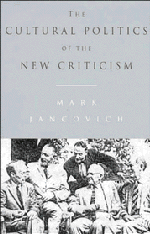Book contents
- Frontmatter
- Contents
- Preface
- List of abbreviations
- Part I The New Criticism and its critics
- Part II The formation of the New Criticism
- Part III The establishment of the New Criticism
- Part IV The development of the New Criticism
- Conclusion: Modernism and postmodernism within the American academy
- Introduction
- 13 The professionalization of literary study
- 14 The New Critical intervention
- 15 Cultural criticism and postmodernity
- Conclusion
- Notes
- Bibliography
- Index
13 - The professionalization of literary study
Published online by Cambridge University Press: 18 December 2009
- Frontmatter
- Contents
- Preface
- List of abbreviations
- Part I The New Criticism and its critics
- Part II The formation of the New Criticism
- Part III The establishment of the New Criticism
- Part IV The development of the New Criticism
- Conclusion: Modernism and postmodernism within the American academy
- Introduction
- 13 The professionalization of literary study
- 14 The New Critical intervention
- 15 Cultural criticism and postmodernity
- Conclusion
- Notes
- Bibliography
- Index
Summary
In fact, the emergence of the professional academic is itself a relatively new phenomenon. As Gerald Graff has pointed out, departments of language and literature only really emerged in the last quarter of the nineteenth century ‘as part of a larger process of professionalization by which the old “college” became the new “university”’. Moreover, these departments of literature and language did not define their form of study as a professional discipline according to the same criteria as contemporary departments of literature. Instead they concentrated on ‘scientific’ research and the philological study of modern languages. When literature was used in these departments, it was studied etymologically and grammatically, as a way of documenting changes in language, not as an aesthetic form. As Graff puts it, ‘the profession of “literary studies” was established before it began to consider literature its subject’. However, while the philologists’ emphasis on their discipline and training allowed them control over their recruitment and their curriculum, they did not go unchallenged. Graff has referred to a ‘competing model’ for the departments of language and literature which was proposed by a group of ‘generalists’. These generalists maintained that philological study was too narrow and specialized for an understanding of culture. They thereby formed an alternative tradition which maintained that the study of literature should be concerned with cultural values not facts. They saw ‘literature as a moral and spiritual force and a repository of “general ideas” which could be applied directly to the conduct of life and the improvement of national culture’. But even this group did not really emphasize the linguistic forms of the text as the object of critical analysis.
- Type
- Chapter
- Information
- The Cultural Politics of the New Criticism , pp. 139 - 140Publisher: Cambridge University PressPrint publication year: 1993



